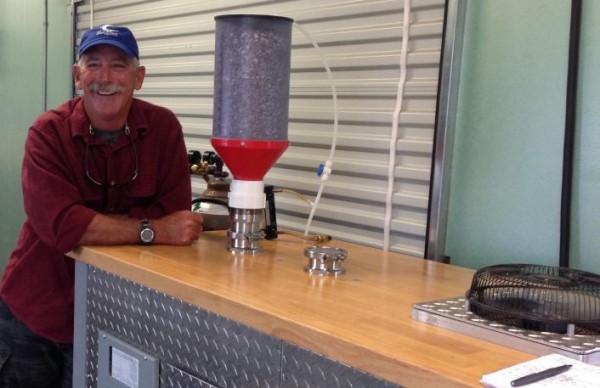By Arthur Dominic J. Villasanta , | April 03, 2017

James Holm (pictured) and Swaminathan Ramesh, Ph.D., teamed up to develop a mobile reactor (also pictured) to convert waste plastic into fuel.
A Ph.D. organic chemist and a sailboat captain have developed a new process to transform certain types of plastics into valuable diesel fuel with a small mobile reactor.
"Fuel" for this mobile reactor will be the billions of pounds of plastic waste littering the world's oceans and landfills. Swaminathan Ramesh, Ph.D. and sailor James E. Holm envision their technology as someday being implemented globally on land and possibly placed on boats to convert ocean waste plastic into fuel to power ships and boats.
Like Us on Facebook
Ramesh was driven by the desire for a new "killer idea" with the power to change the world. After retiring in 2005, Ramesh formed EcoFuel Technologies and coupled his chemical knowledge with Holm's concerns about plastic wastes and ocean pollution.
In the meantime, Holm had formed Clean Oceans International, a nonprofit organization. A sailor for 40 years Holm said he watched the sea and coastline become more and more polluted.
"A few years ago, I was sailing through the Panama Canal, and when I stopped at an island on the Atlantic side, I was stunned by the amount of plastic covering the beach. I thought if I had a chance to do something about it, I should."
The partners sought to optimize a technology that can use waste hydrocarbon-based plastics as a feedstock for diesel fuel. Their goal was to rid the world of plastic waste by creating a market for it.
Ramesh explains that pyrolysis technologies have long been used to break down or depolymerize unwanted polymers such as plastic wastes, leaving a hydrocarbon-based fuel. But the process usually calls for complex and costly refining steps to make the fuel useable.
Ramesh set out to change the game and developed a metallocene catalyst deposited on a porous support material that yields diesel fuels directly without further refining when coupled with a controlled pyrolysis reaction.
It's also cost-effective on a small scale, runs at lower temperatures and is mobile. The whole system can fit in a 20-foot shipping container or on the back of a flat-bed truck.
"The catalyst system also allows us to perform the pyrolysis as a continuous-feed process and shrink the footprint of the whole system," said Ramesh.
"We can scale the capacity to handle anywhere from 200 pounds per 10-hour day to 10,000 or more pounds per 10-hour day. Because of its small size, we also can take the technological process to where the plastic wastes are."
The next step is to show the technology works well and it can create a useable drop-in diesel fuel.
They will soon conduct a demonstration project for the government of the city of Santa Cruz, California. Officials there are interested in implementing the technology to address waste plastics that currently cannot be recycled, as well as to formulate diesel fuel the city can use for its vehicles.
-
Use of Coronavirus Pandemic Drones Raises Privacy Concerns: Drones Spread Fear, Local Officials Say

-
Coronavirus Hampers The Delivery Of Lockheed Martin F-35 Stealth Fighters For 2020

-
Instagram Speeds Up Plans to Add Account Memorialization Feature Due to COVID-19 Deaths

-
NASA: Perseverance Plans to Bring 'Mars Rock' to Earth in 2031

-
600 Dead And 3,000 In The Hospital as Iranians Believed Drinking High-Concentrations of Alcohol Can Cure The Coronavirus

-
600 Dead And 3,000 In The Hospital as Iranians Believed Drinking High-Concentrations of Alcohol Can Cure The Coronavirus

-
COVID-19: Doctors, Nurses Use Virtual Reality to Learn New Skills in Treating Coronavirus Patients










